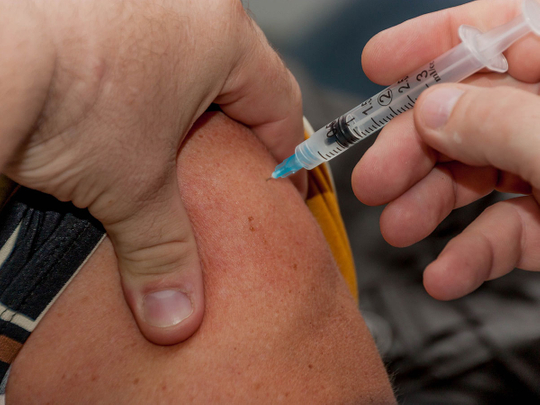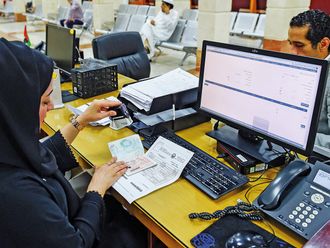
Abu Dhabi: The UAE is at “peak readiness” to deal with the upcoming flu season, top doctors have assured.
Health professionals have said that they have received the approved flu vaccines for the year and are ready to face any challenge during the upcoming flu season in the midst of the COVID-19 pandemic.
See more
- Pictures: First Chinese public school opens in Dubai
- UAE: Ticket cancelled due to COVID-19, but no refund from travel agency, for over 60 days
- Shoppers flock to malls for the Dubai Summer Surprises final weekend
- Back to school: See how Dubai schools disinfect buses ahead of new term
- Photos: Gulf News reader shares pictures of the desert safari tour in the UAE
- Pictures: US-Israeli delegation lands in UAE on historic flight
“I’d like to put everyone’s mind at ease, the wise leadership of the UAE has made the flu vaccine available to us. If we continue to abide by the safety guidelines, the number of flu cases will be less than any of the previous years,” said Dr Anwar Sallam, chief medical officer at Abu Dhabi’s public health provider, the Abu Dhabi Health Services Company (Seha).
‘Fully prepared’
“We are at peak readiness as a nation to face the flu season and COVID-19: Health-care facilities, field hospitals, medicines and PPEs [personal protective equipment] are all ready,” he added.
The flu season lasts each year between September and March. This year, there is greater focus on viral illnesses as a result of COVID-19.
Dr Jamal Al Kaabi, undersecretary at the emirate’s health regulator, the Department of Health (DoH), told Gulf News that it was important to get vaccinated against the flu.
Free vaccines
Abu Dhabi’s public health facilities dispense with the flu vaccine free of charge to all residents each year and urge people to protect themselves. The cost differs across private health providers, but is always well below Dh100 per person.
Yet, not enough people get vaccinated each year, doctors say.
Flu is serious
“The flu is a serious illness, especially for people with chronic conditions, including diabetes, lung disease, hypertension, etc. Every year, about 60,000 people die in the United States as a result of it. But there is simply not enough awareness about its risks,” said Dr Fadi Baladi, internal medicine consultant and medical director at the Burjeel Day Surgery Centre on Reem Island.
According to the DoH, most people recover from the flu within two weeks of being infected, but some may develop serious health problems, including infections in the lungs, ear and sinuses. The flu can also be life-threatening for younger children, pregnant women, older adults and people with chronic health problems or weakened immunity.
Not enough awareness
Dr Baladi added that there is slightly more awareness this year because of COVID-19.
“But it is certainly not as much as it should be. In comparison, the proportion of people who get vaccinated in the West is at least ten times higher,” Dr Baladi said.
Many people are sceptical about the flu vaccine because the shot does not fully protect against illnesses from all flu strains.
“But we know that it makes symptoms milder, and this is an important benefit. Another reason people do not get the vaccine is because they are simply not informed enough and this is on us physicians. We don’t talk about it [the importance of the flu vaccine] enough,” the doctor said.
COVID-19 with the flu
Dr Baladi also clarified that people can get both the flu and COVID-19 together.
“The flu reduces people’s immunity, which then makes them vulnerable to other illnesses, including COVID-19,” the doctor said.
Like other immunisations, the flu vaccine should not be taken when someone is unwell or running a temperature.
“But this is the right time to get vaccinated, since flu season has not peaked yet. We will start offering the shots within a few days. For those who are not covered by insurance, each jab will cost Dh49 per person,” Dr Baladi clarified.
This is in keeping with DoH recommendations, which advises people to get vaccinated before the onset of winter, in September and October.
Symptoms not always clear
Like COVID-19 and the common cold, the flu too presents with respiratory symptoms, bodyaches and fever.
“Flu and COVID-19 are both respiratory illnesses, but are caused by different types of viruses. It may be difficult to tell the difference between them as symptoms of flu and COVID-19 are similar. Symptoms vary from asymptomatic or mild through to severe symptoms and complications that can lead to death. Laboratory testing is required to confirm a diagnosis,” the DoH says on its online advisory on seasonal influenza.
Constant vigilance
Dr Al Kaabi said that health authorities will be closely monitoring the relationship between flu and COVID-19.
“We will keep monitoring the relationship between flu and COVID-19. Right now, everyone will come with flu-like symptoms, and it is not always easy to differentiate between flu and COVID-19. So we will consider everyone as COVID-19 until proven otherwise so that we can be careful,” he said.
Reducing health burden
According to the DoH, it is important to get the flu vaccine during the COVID-19 pandemic.
“The flu vaccine will help protect the community from outbreaks and prevent unnecessary medical visits and hospitalisations. [The influenza] vaccination is essential this season to reduce the resulting burdens on health-care systems, which is already strained by the COVID-19 response,” it says.
Get available vaccine
Since people can get both the viral illnesses together, it is a good idea to protect oneself from the one for which there is an approved vaccine.
“Currently there is not enough information about the effect on patients with both flu and COVID-19, or whether influenza can lead to severe complications in patients already infected with COVID-19. Therefore, flu vaccination is important to reduce co-infection,” the DoH says.











